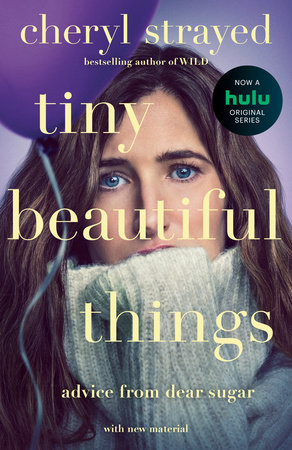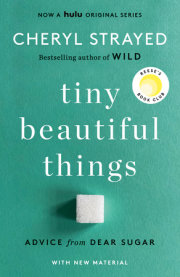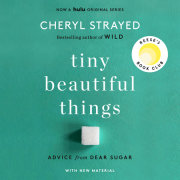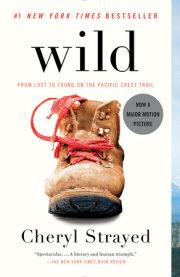“Penning an advice column for the literary website The Rumpus, [Strayed] worked anonymously, using the pen name Sugar, replying to letters from readings suffering everything from loveless marriages to abusive, drug-addicted brothers to disfiguring illnesses. The result: intimate, in-depth essays that not only took the letter writer’s life into account but also Strayed’s. Collected in a book, they make for riveting, emotionally charged reading (translation: be prepared to bawl) that leaves you significantly wiser for the experience. . . . Moving. . . . compassionate.” —Leigh Newman, Oprah.com
“A fascinating blend of memoir and self-help. Strayed is an eloquent storyteller, and her clear-eyed prose offers a bracing empathy absent from most self-help blather.” —Nora Krug, The Washington Post
“Strayed’s worldview—her empathy, her nonjudgment, her belief in the fundamental logic of people’s emotions and experiences despite occasional evidence to the contrary—begins to seep into readers’ consciousness in such a way that they can apply her generosity of spirit to their own and, for a few hours at least, become better people. . . . The book’s disclosures—on the part of both the writer and her correspondents—is ultimately courageous and engaging stuff.” —Anna Holmes, New York Times Book Review
“Wise and compassionate.” —Gregory Cowles, New York Times Book Review “Inside the List”
“It seems inadequate to call ‘Dear Sugar’ an advice column, because it exists in a category all its own . . . Part memoir, part essay collection, the aptly titled Tiny Beautiful Things gathers together stunningly written pieces on everything from sex to love to the agonies of bereavement. Strayed offers insights as exquisitely phrased as they are powerful, confronting some of the biggest and most painful of life’s questions. . . . . In her responses, Strayed shines a torch of insight and comfort into the darkness of these people’s lives, cutting to the heart of what it means to love, to grieve and to suffer.” —Ilana Teitelbaum, Shelf Awareness
“What makes a great advice columnist? . . . Strayed has proved during her tenure at the website the Rumpus, where she has helmed the Dear Sugar column since 2010, that the only requirement is that you give great advice—tender, frank, uplifting and unrelenting. Strayed’s columns, now collected as Tiny Beautiful Things, advise people on such diverse struggles as miscarriage, infidelity, poverty and addiction, and it's really hard to think of anyone better at the job. Strayed has succeeded largely because she shares personal, often heartbreaking stories from her own life in answering readers' questions. Her experiences are qualifications, in a sense, as Strayed has taken the wisdom she gained from personal tragedies, including her mother's early death and the breakup of her first marriage, and generously applied it to all manner of issues. . . . What runs through all the columns, which range from a few hundred to a few thousand words in length, is Strayed’s gift at panning out from the problem in question. Often, the fuller picture that Strayed gives us illustrates what needs to happen for the letter-writers to change, to pull themselves out of their current predicament, to see things in a different way, to act. . . . Here is Strayed’s breathtaking ability to get to the core of her own failures and triumphs, which she often does through surprising and sharp imagery. . . . Strayed has covered much ground in these transformative pieces. In the end, Tiny Beautiful Things serves as a guide for anyone who is lost, and those who only think they might be.” —Liz Colville, San Francisco Chronicle
“As Sugar, Strayed addresses questions about love, family, addition, grief, abuse, afflictions, fears, friends, gossip, among other topics—and in each of her answers, without fail, she meets the letter writers with a kind of startling compassion; what Steve Almond termed ‘radical empathy.’ Dear Sugar is an advice column like no other.” —Nika Knight, Full Stop
“It is very rarely that I am a ridiculous fangirl about anything. It’s so emotionally taxing, so inherently undignified, that I try not to fall into the trap. So it took me by surprise when, upon discovering Dear Sugar at the Rumpus, I gradually fell down the rabbit hole into ridiculous fangirlishness for the first time in years. [Strayed took me to] the edge of the dark wood, staring into the place where the most wrenching and lovely truths reside. A place to lose your heart and find it again. If there is a common thread that unites the columns, it’s work. Sugar doesn’t tolerate laziness: doing the work to reach one’s full potential, to write that novel, to exorcise ghosts, to let go of resentments and jealousy and commit instead to generosity and love—all of these are sacred, lifelong tasks for which there are no shortcuts. The columns are a gift, and so too is the book. As Sugar herself bids in her column of the same name, I've written this now on the eve of her book’s publication with one intent: to say thank you.” —Ilana Teitelbaum, The Huffington Post
“Typically an advice column might not be the first thing to come to mind when considering examples of fearless first-person writing. But Cheryl’s Dear Sugar column is a major exception in that way. In the majority of her column entries, she boldly delves into her own life, to places where she’s had to overcome obstacles similar to those her letter-writers have experienced. Her understanding and compassion are real and hard won, rooted in her own experiences. And so is her sometimes butt-kicking advice. ‘If I was able to do this,’ she seems to be saying, ‘so can you, sweet pea. Now get off your ass and do it.’ The stakes may have seemed lower when she was writing the column anonymously. But Cheryl says she always knew she’d eventually reveal herself—which she did in April. Now many of her best Dear Sugar columns have been gathered into Tiny Beautiful Things, a collection that goes on sale this week (and is available through The Rumpus). Her name is on it; the revelations, the fearless admissions are hers. And I’m awed.” —Sari Botton, The Rumpus
“Sugar didn’t pen a few plucky paragraphs about how to pick yourself up by your socks and move on from whatever horrors befell you—in many cases Sugar’s letters were heart-rending exhumations of her own past in search of parallels to the advice-seeker’s situation. She didn’t shy from plumbing her own failings, flaws, and troubles. But in the end, Sugar’s columns are about heart and love. Not saccharine, treacly love that comes from greeting cards, but the gritty, painful, sometimes mundane work it takes to love yourself, warts and all. Tiny Beautiful Things isn’t really a compilation of her advice columns. More, it’s a series of essays about life in all its grimy, unpleasant heartache, and a plea to rise above it to love truthfully and deeply and well, despite all our handicaps. Sugar navigates the path through the treacherous human psyche as a shining beacon before us, flickering in the dark. . . . [She] gives her best, even when she’s tired. . . . I’m glad that the world is learning about all the love that Sugar has to give.” —Quenby Moone, The Nervous Breakdown
“Strong, smart and self-assured: those qualities are in full power in [Tiny Beautiful Things]. Strayed doesn’t just give good advice. People write in with the most wrenching personal problems, and receive generous, seriously motivating inspiration to move on and do better. . . . Dear Sugar is a rare hideout from the prevailing meanness of the Internet. She calls her readers Sweet Peas, shares stunningly intimate stories about her life, and writes with true warmth and kindness. And it’s not an act. . . . Strayed aims to help not just the people whose letters she answers, but the wider audience who reads the exchanges. Her responses are direct and personal, but peppered with universal messages that cut to the heart.” —Amy Goetzman, MinnPost
“Why do we read memoirs? Some choose autobiographies to better understand the lives and histories of important men and women. Some might hope that the experiences and insights of a personal essay might unveil a small truth about the human condition, might teach us about ourselves. Some of us might just be busybodies, looking for a socially acceptable way to peek deeply into a stranger’s life. If you fit into any of these categories, you must meet Dear Sugar, the ultimate advice columnist for lovers of memoirs. Tiny Beautiful Things is a collection of her works, interspersed with Q&As from Sugar herself. The columns were written anonymously, but with an amount of personal detail that no advice column has ever seen before. In a gracious, sassy, poetic and maternal voice, Sugar shares her own raw personal accounts . . . She runs a highlighter over the breathtaking aspects of mundane tasks, from wedding planning to the day-to-day duties of raising small children. By the last page of the book, which will likely be a bit wrinkled with tear stains by the time you’re through, you may know more about Sugar than you know about your closest friends. . . .Though many of the letters she receives contain ugliness and woe, she weaves them together into a story that is unexpectedly beautiful and impossibly warm. There’s no shortage of conversations on love and sex, but we words also go beyond that. . . . There’s something worth quoting on almost every page. . . . Eloquent . . . Generous.” —Kara Zuaro, Biogrophile
“In this collection of her columns, Strayed proves herself to be an astute amateur psychologist, as well as a compassionate, thoughtful and occasionally tough counselor. As with all personal advice columns, the questions that readers pose to Sugar are at least as intriguing as the answers. Strayed . . . uses her own foibles and misdemeanors to show that ‘we all suffer, we all fail, we all struggle and triumph and struggle again.’” —Cynthia Crossen, The Wall Street Journal
“Strayed has a special talent for glimmering, golden turns of phrase that seem to hold all the promise and hope in the world—they’re Bible verses for a secular audience—but these are not the sort of mottos that you’ll find on, say, motivational posters on Pintrest. . . . Most remarkable has been Strayed’s willingness to use her own story, to revisit her most hopeless, fumbling moments—from drug use to infidelity—in answering readers’ questions. . . . The magic is in these unexpected connections, her ability to make the specific universal. She refers to letter writers as ‘sweet pea’ and ‘honey bun,’ but never lets them off the hook. No matter how tragic their predicament, she exhorts them to be their ‘best, most gigantic self,’ that ‘every last one of us can do better than give up.’ It is tough, smart, real love.” —Tracy Clark-Flory, Salon
“To say that Cheryl Strayed is an Internet advice columnist does not do her justice. Tiny Beautiful Things is a gob-smacking high, a brilliant reinvention of the Miss Lonelyhearts genre. . . . This collection of poignant insights into the complexities of the human heart offers a form of radical empathy and inspired compassion from a fellow traveler—one who not only feels the pain of others but leads them toward light and art.” —Elizabeth Taylor, The Chicago Tribune
“The problem with advice columnists [was that] they were supposed to help you solve your problems, but they didn’t reveal much about their own lives, so it was hard to understand why you should trust them. Cheryl Strayed changed all that with Dear Sugar, a deeply personal advice column that’s earned a devoted following. Beautifully written . . . honest and forthright. . . poignant and personal, unlike the string of clichés other writers throw at readers. She proves real connection is still possible, even on the Internet, where everyone’s shouting to be heard. She delivers tough love, very gently. There’s a lesson in here for everyone, sweet peas. You just have to find yours. Grade: A” —Melissa Maerz, Entertainment Weekly
“When I was younger, the Dear Ann and Dear Abby columns that ran in newspapers offered a fascinating look at other people's problems. Eventually, though, the advice coming from pseudonymous writers felt distanced and staid, especially compared to the next generation of advisers who staked out the alternative papers and web sites. . . . My current favorite, by far, is “Dear Sugar,” written by Cheryl Strayed. . . . Tiny Beautiful Things collects Strayed’s columns, and it perfectly captures why she has completely won me over. Strayed can be profane, but she offers sympathy, sound advice, gentleness and a surprising amount of confession.” —Vikas Turakhia, Cleveland Plain Dealer
“A good psychoanalyst does two things: she listens, and she dissects. In Tiny Beautiful Things, Strayed does both adeptly. Sugar forces us to swallow sometimes painful realizations about what we want, who we are, and what we therefore must do—or, if not that, the choices we must make. She also lays bare the impossibility of controlling what isn’t ours to control. . . . The honesty is far more comforting than shallow promises would be. Sugar can handle what’s real in us. . . . If she can handle our treacherous secrets without disintegrating, maybe others will accept us in our entirety, too. Maybe we can accept ourselves. . . . Sugar seems to have had more experiences than any human we’ve ever met, like some sort of omniscient goddess. . . . These stories are not written for their own sake, but as a way to explain human complexity. The details of her past theft comes out as a means of empathizing with a writer ashamed of the same. Sugar describes her husband’s infidelity to help a fiancée with a stark, black-and-white view of marriage consider nuance. This is the type of meaning-making any personal essayist or memoirist should aim for, of course—and, notably, Strayed is both—but it’s all the more explicit and obvious in an advice column. Strayed’s story is, in its way, a mirror. One of Strayed’s most vital messages—which her revelations of past lapses are meant to show—is that being a real, whole person means being imperfect. Sugar models this not only in her history, but in her letters, too. Once in a while, she falters. . . . Sugar is good enough, but not perfect. Which is exactly what she’s been trying to tell us all along.” —Jessica Gross, The Millions
“Many of the pieces in Tiny Beautiful Things, which first appeared in the online literary magazine The Rumpus, have had robust first lives, circulated on the Internet by fans. In book form, the letters and Strayed’s responses take on greater meaning as an extended epistolary essay on the human condition—with its antsy spouses, frustrated parents and desperately indebted students—and also as a companion autobiography to Wild. Sugar’s technique is to share the thorniest, most indelible experiences from her life to help each letter writer work through his or her own, which makes Tiny Beautiful Things an odd, contradictory and moving invention: an anecdotal memoir—that most narcissistic of genres—whose every chapter is written lovingly and generously to someone else. . . . Sugar is sharp-witted, but she doesn’t do funny. She doesn’t do snarky. (This distinguishes her from, to state it conservatively, most of the Internet.) And Sugar doesn’t coddle. She especially doesn’t coddle writers. . . . Stillness pervades Strayed’s Dear Sugar columns, which profit from all the advantages of the Internet—its anonymous e-mail forms, endless terrain and capacity for comments and community building—but provide refuge from its white noise. It’s partly because of the emotional content of each letter and response, but also due to the inherent intimacy of the form. Direct address is as old as lyric poetry: it’s just I and you—and the rest of the world gets to listen in.” —Radhika Jones, Time Magazine
“Strayed, in this collection of advice (some previously unpublished) for readers of her ‘Dear Sugar’ column on therumpus.net, chooses thought-provoking questions from her readers and listens deeply to their emotional content. In casually intimate prose and with literary grace, she creates moments of wise, compassionate insight in often startlingly personal miniature memoirs, cradling gentle but practical guidance with enough humor to cement Strayed’s presence as both a mentor and the most understanding of friends. Sugar can be tough and honest, but she’s never mean: in Sugar’s world, we all deserve love unconditionally, but also owe it to ourselves to be the best, most authentic selves we can be. For a regrounding in the beauty of what it means to be flawed and gorgeously human, for answers that feel real, Strayed’s caring essays offer surprisingly rich comfort.” —Publishers Weekly (starred review)
“This beloved Internet advice columnist, using the pseudonym Sugar, revealed herself in early 2012 to be the acclaimed novelist and memoirist Strayed. First appearing on the Rumpus in 2010, her column ‘Dear Sugar’ quickly attracted a large and devoted following with its cut-to-the-quick aphorisms like ‘Write like a motherf*cker’ and ‘Be brave enough to break your own heart.’ This collection gathers up the best of Sugar, whose trademark is deeply felt and frank responses grounded in her own personal experience; in many ways, it is a portrait of Strayed herself. She answers queries on subjects ranging from professional jealousy to leaving a loved partner to coping with the death of a child. VERDICT: Part advice, part personal essay, these pieces grapple with life’s biggest questions. Beautifully written and genuinely wise, this book is full of heartache and love. Highly recommended.” — Molly McArdle, Library Journal (starred review)
“Strayed offers insight into the world of online advice through her collection of letters sent to ‘Dear Sugar,’ her once-anonymous column for the online magazine The Rumpus. Sugar’s Golden Rule—‘Trust Yourself’—pushes the author and her readers to embrace themselves and not be afraid of asking life’s complex questions. . . . Strayed’s practical advice mixes with abundant personal anecdotes in which she illustrates to the addressee the reasoning behind her counsel. Admittedly not versed in psychology, her responses are sensitive and comprehensive, and her self-reflection projects understanding and sympathy. . . . The author’s comforting yet stern writing style connects readers to each contributor’s plight and the subsequent response to their cry for help. Appealing to Dear Sugar fans and self-help seekers alike, this ‘collection of intimate exchanges between strangers’ demonstrates that wisdom doesn’t come only from age, but also from learning from the experiences of others. A realistic and poignant compilation of the intricacies of relationships.” —Kirkus Reviews
“These pieces are nothing short of dynamite, the kind of remarkable, revelatory storytelling that makes young people want to become writers in the first place. Over here at the Salon offices, we're reading the columns with boxes of tissue and raised fists of solidarity, shaking our heads with awe and amusement.” —Sarah Hepola, Salon
“Sugar doesn't coddle her readers—she believes them, and hears the stories inside the story they think they want to tell. She manages astonishing levels of empathy without dissolving into sentiment, and sees problems before the reader can. Sugar doesn't promise to make anyone feel good, only that she understands a question well enough to answer it.” —Sasha Frere-Jones, The New Yorker critic
“Powerful and soulful, Tiny Beautiful Things is destined to become a classic of the form, the sort of book readers will carry around in purses and backpacks during difficult times as a token or talisman because of the radiant wisdom and depth within.” —Aimee Bender, author of The Particular Sadness of Lemon Cake
“[Sugar is] turning the advice column on its head.” —Jessica Francis Kane, author of The Report
“Sugar’s columns are easily the most beautiful thing I’ve read all year. They should be taught in schools and put on little slips of paper and dropped from airplanes, for all to read.” —Meakin Armstrong, Guernica editor
“Dear Sugar will save your soul. I belong to the Church of Sugar.” —Samantha Dunn, author of Failing Paris
“Charming, idiosyncratic, luminous, profane. . . . [Sugar] is remaking a genre that has existed, in more or less the same form, since well before Nathanael West’s Miss Lonelyhearts first put a face on the figure in 1933. . . . Her version of tough love ranges from hip-older-sister-loving to governess-stern. Sugar shines out amid the sea of fakeness.” —Ruth Franklin, The New Republic









